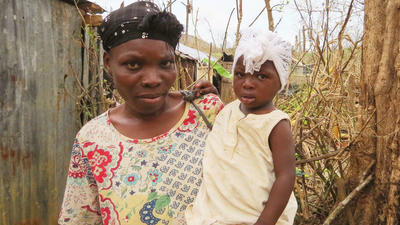The siege has been bad - but we didn’t fear it as much as we fear the bombs.
My name is Umm Leen. I’m a mother of seven and I’ve never been outside east Aleppo, from the day I was born until now.
My eldest daughter is 16. She was six months pregnant, but suffered a miscarriage two weeks ago.
I had a son of 12, but he was killed by a piece of shrapnel which pierced his heart.
My youngest is a baby boy, aged three months. I gave birth to him during the siege, a month early, because of the heavy shelling and my panic attacks.
Birth in a war-zone
In the past two years, I’ve had miscarriage after miscarriage. This pregnancy too, was full of problems.
I went into threatened premature labour in the second and third month of my pregnancy, and had to visit hospital every 10 days.
I had low blood pressure, severe anaemia and low calcium levels. I was always tired and dizzy.
In the first week of August, the midwife told me to prepare myself for the birth and buy the drugs I needed. I had to get medications from pharmacies, as they weren’t available in hospitals.
"My biggest fear was that we would run out of fuel in the middle of the road with the shells raining down around us."
Two days later, at 5 am, my waters broke. There was no one to take me to the hospital, and there was no public transport either. We couldn’t call an ambulance – there is so little fuel that ambulances only come for the most critical cases. In the end my husband stopped a car in the road and begged the driver to take us to any hospital.
There was very intense shelling, and we didn’t know if we would make it. He drove at incredible speed because of the bombardment – we got there in just 12 minutes. My biggest fear was that we would run out of fuel in the middle of the road with the shells raining down around us.
During the labour, I was on my own. There’s no one here in east Aleppo from me or my husband’s family – we are the only ones left. My husband waited downstairs.
Five hours later I gave birth.
It was after I delivered the baby that the problems began. I was haemorrhaging, so they put ice bars on my stomach and inside my womb to try and stop the bleeding.
I did my best to breastfeed the baby, despite having had nothing to eat and being undernourished.
I was discharged on the same day, because the shelling was so intense and the hospital was inadequately protected. After I left the hospital, four missiles exploded right in front of the building.
My baby stayed on in the hospital for another 15 days. He weighed just 1.2 kg and I didn’t expect him to live. But he has hung on.
"Am I supposed to sit and watch him die in front of me?"
The seige has caused huge shortages of all kinds of foods - because mothers are unable to maintain a healthy diet, many babies are underweight.
In August, during the early months of the siege, things weren’t as bad as they are now. They still had formula milk in the hospital, so they’d fix a bottle for my baby and feed him. Otherwise, I would express my milk into a bottle and feed it to him.
But now there’s no formula milk around, so I’m grinding up rice and feeding it to him instead.
"We are just waiting for our children to die."
He is losing weight and is very weak. Am I supposed to sit and watch him die in front of me?
My other children are all incredibly thin, too, because we have almost nothing to eat.
We haven’t had any nappies for three months, so people are using rags instead, but this gives the babies rashes.
My daughter has a very bad cough, but the children’s hospital has been bombed. I don’t know where to take her. We can't take them out of east Aleppo.
"The children get so frightened - it breaks my heart"
We are just waiting for our children to die.
When a baby is born, some people believe they are making up for the children they have lost. But for me, in these conditions, I think it’s a huge mistake.[[Article-CTA]]
After I gave birth to him, I felt so sad. Did I give birth to him to see a life like this?
The children get so frightened whenever they hear a plane – they run towards me.
It breaks my heart.
I just hope my children stay safe and sound, because there are no hospitals to take them to.
But I don't even know if we'll survive this.





